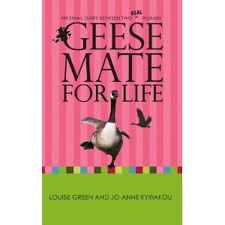
GEESE MATE FOR LIFE
Australia, 1975, 45 minutes, Colour.
Tony Llewellyn Jones, Kate Reid.
Directed by Virginia Rouse.
Geese Mate for Life is a short feature by Virginia Rouse, co-writer and director. She was to go on to write and direct the feature To Market, To Market. The film is something, of a Melbourne two-hander, with Tony Llewellyn- Jones and Kate Reid as a husband, and wife in an affluent suburb, their growing estrangement. The film focuses on the hero's mother as well as their two young daughters. There are also some business friends and acquaintances.
The film is a blend of realism, life in affluent suburbia, with some surrealistic features focusing on nursery rhymes, music (especially that of Bach) and the disintegration of the wife's world.
The film is both cerebral and emotional, focusing sympathetically on the plight of the wife in suburbia.
1. The impact of this film? As a short story? Portrait of characters? Exploration of men and women in marriage, in suburbia?
2. Melbourne locations, the couple's home, golf courses, the environment of the city streets? An authentic feel of the city? The use of music, nursery rhymes, the range of selections from J.S. Bach, especially 'Jesu, joy of Man's Desiring'?
3. The focus on the family, audiences identifying with them: the home, comforts, work, leisure, the business associates, meals, the children? The comforts of the home including the swimming pool?
4. The focus on Elizabeth: as sympathetic to her, her exasperation with Christopher, throwing his golf clubs in the pool, their remaining there, her finally wading in to get them out? Her forbidding him to get them out? A symbolic defiant stand? Her relationship with her children? Nursery rhymes and Songs? Discipline? Her mother-in-law and her visits, comments, looking after the children, criticisms? Her relationship with Christopher, love, the disintegration of love, his not understanding her, not talking? Clashes against him, reconciliations? The visit of the three wives and their gossip, the soundtrack blurring with the chatter of the women? Their children? Christopher's going to Singapore, the planning for the dinner? her enjoying the week of his absence? Doing things for herself? The preparation for the dinner, dressing? The scenes in her bathroom (and her imagination of her children)? The dinner, the small-talk, her being introduced, her being ignored, at the table, people asking her questions and not listening? Her retreating to the kitchen? Pretending to ring the Lifeline, talking about her desperation? The clash with Christopher? Her finally getting the clubs from the pool? The finale going back to the photo with Christopher and the cat and herself with the toy goose? The symbolism of the cat and the goose? What was the audience left with? Elizabeth's future?
6. The symbolism of cats and geese, Goosey Goosey Gander? Vanessa's playing with the goose and it; being her companion? Compatibility of cats and geese? The cat in the house, at the dining-room table? The toy goose? Their presence in the final. photo?
7. Christopher as the successful businessman, his status, golf and the golf clubs in the pool, his wanting to get them, out Elizabeth forbidding him? His swimming but not getting them out? His offhand manner towards herself and her lunch with the women? His love for his daughters, reading them stories, explaining nursery rhymes to them? Going to Singapore, the return and the trip with his mother, the dinner and his enjoying it, the friends from Sydney, the host, not realising what was happening to Elizabeth, the discussion about Lifeline in the kitchen? His playing golf and ignoring her?
8. The sketch of the children, in the household, with their grandmother, with the parents, the nursery rhymes? Vanessa and her love for them?
9 The mother-in-law, her comments, driving from the airport, criticism of Elizabeth?
10. The women friends, the gossip, their interests, criticisms?
10. The dinner guests, their elegance, wealth, interests, table talk? Ignoring of Elizabeth? Michael and his self-centredness? Elizabeth's reaction to them - the billiard table, the serving of the coffee, her talk about novelists, her self-assertion - and their shock?
11. Themes of contemporary city life, marriage, family, work, status, disintegration of relationships?